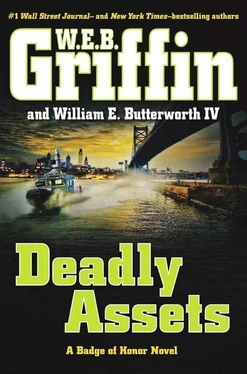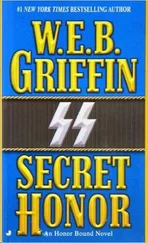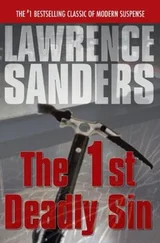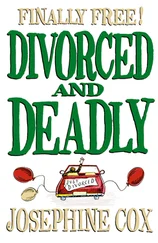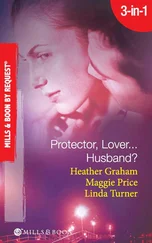W. Griffin - Deadly Assets
Здесь есть возможность читать онлайн «W. Griffin - Deadly Assets» весь текст электронной книги совершенно бесплатно (целиком полную версию без сокращений). В некоторых случаях можно слушать аудио, скачать через торрент в формате fb2 и присутствует краткое содержание. Год выпуска: 2015, Издательство: G.P. Putnam, Жанр: Полицейский детектив, на английском языке. Описание произведения, (предисловие) а так же отзывы посетителей доступны на портале библиотеки ЛибКат.
- Название:Deadly Assets
- Автор:
- Издательство:G.P. Putnam
- Жанр:
- Год:2015
- ISBN:нет данных
- Рейтинг книги:4 / 5. Голосов: 1
-
Избранное:Добавить в избранное
- Отзывы:
-
Ваша оценка:
- 80
- 1
- 2
- 3
- 4
- 5
Deadly Assets: краткое содержание, описание и аннотация
Предлагаем к чтению аннотацию, описание, краткое содержание или предисловие (зависит от того, что написал сам автор книги «Deadly Assets»). Если вы не нашли необходимую информацию о книге — напишите в комментариях, мы постараемся отыскать её.
Deadly Assets — читать онлайн бесплатно полную книгу (весь текст) целиком
Ниже представлен текст книги, разбитый по страницам. Система сохранения места последней прочитанной страницы, позволяет с удобством читать онлайн бесплатно книгу «Deadly Assets», без необходимости каждый раз заново искать на чём Вы остановились. Поставьте закладку, и сможете в любой момент перейти на страницу, на которой закончили чтение.
Интервал:
Закладка:
“I would hesitate using the word clever , Matthew, but I will grant that it rises above the crudeness of these other illiterate messages. Regardless, they all anger me.”
Payne shrugged. “You know that people get brave online when they can hide behind their keyboard, Jason.”
“True. Let’s just hope that’s all it is, nothing more than tough rhetoric fueled by Reverend Cross,” Washington said. “Denny also said he was impressed with your remarkable restraint when Cross attempted to ambush you during the television interview at the LOVE Park scene.”
Payne’s mind flashed back to the moment he caught a glimpse of the tall, skinny, bearded forty-year-old African-American in his black cloak and white clerical collar, approaching the camera crew.
“Fortunately,” Payne said, “I saw him coming out of the corner of my eye and figured what he probably was up to.”
“The posters being your first clue?” Washington said drily.
Payne grinned.
“I admit I can be more than a bit slow, Jason, but I eventually figure things out.”
Washington chuckled.
“I damn sure didn’t want a confrontation,” Payne went on, “at least not one caught on camera. I leaned in close to the microphone so I’d be heard over the chanting, and said, ‘Excuse me. I have a job to do. And I would suggest that someone trying to create a cause célèbre on the spot where a young woman has just been brutally murdered is disrespectful at best, and damned disgusting at worst.’”
Washington raised an eyebrow.
“That sound bite should make headlines,” he said. “Especially when they edit out all but the last part, and begin with ‘. . I would suggest.’ Between the two of us, good for you. But I caution you to be careful. As you know, he was just elevated to chairman of CPOC.”
“So?”
“So you well could be the trophy he wants to make a name for himself.”
–
Pronounced See-Pock , the acronym stood for Citizens Police Oversight Committee. The five people on the self-governed entity were appointed to staggered terms by each of the city council members serving on the council’s Committee for Public Safety. Current members were a female African-American pro bono publico criminal defense lawyer, a white Roman Catholic bishop, a Temple University professor of sociology who was a female of Puerto Rican heritage, a male civil engineer whose parents had emigrated to Philly from India, and its longest-serving appointee, whose five-year term would expire within the next ten months, the Reverend Josiah Cross.
CPOC had come into existence a quarter-century earlier, in the aftermath of the city’s race riots. The then mayor had thrown it out as a bone, hoping to appease, if not silence, community activists. They complained that the police department’s Internal Affairs Unit was nothing more than the cops policing themselves-read: paying lip service to allegations of misconduct, and doing next to nothing about said misconduct-and demanded an independent board.
Over the years, the members of CPOC, charged with only a mandate of reviewing and advising the mayor and city council on matters pertaining to police department policy, rarely accomplished anything beyond creating self-serving headlines. Which many observers said wasn’t exactly a surprise, as it was very much in line with the accomplishments of the city council members themselves, ones who (a) knew they were appointing them to a position that in essence was political patronage, and who (b) quietly expected a portion of the CPOC member’s annual $80,000 salary to find its way into the patron’s reelection war chest.
–
“I appreciate what you’re saying, Jason,” Payne said. “He’s a grandstanding troublemaker. And I’m not going to let anyone from CPOC bother me. Every damn member comes with some ax to grind. Starting with that fraud who says he ‘found’ religion in the slam.”
Washington chuckled deeply.
“Discretion being the better part of valor, Matthew, I probably should not tell you this, but I heard that the new head of the city’s public relations department-”
“That tiny guy who’s working for Ed Stein? Whatshisname? Finley?”
Washington nodded. “That’s right, I forgot you met him shortly after Ed was tapped as the mayor’s new adviser and brought him for a tour here. James Finley. As I was saying, I shouldn’t tell you that Finley was said to have, at least at first, appeared quite excited by the tension of the moment. But then he announced to the mayor that he was terribly afraid you actually were about to shoot Cross right there on live television.”
Payne grinned.
“The thought crossed my mind. He deserved it for any number of reasons. But then I realized there’s probably a line of people ahead of me really wanting to whack Skinny Lenny, beginning with his old drug-running pal he ripped off.”
Washington knew the story. The grittier details had been circulated by Cross’s detractors shortly after his appointment to CPOC.
[TWO]
A decade earlier-listed in police records as “MUGGS, Leonard Robert, Also Known As ‘Skinny Lenny’”-the Reverend Josiah Cross had completed a year and a day in the slam. His offenses included assault and forgery of a financial instrument-while hopped up on crack cocaine, he’d beaten an elderly neighbor with a baseball bat, then cashed the old man’s welfare check. Cross had, as he put it, “suffered an unfortunate incarceration for a simple misunderstanding at a difficult point in life, and I’ve paid my dues for it,” then returned to society penniless but on a mission and with a new identity.
Having arranged for a money order in the amount of thirty-five dollars to be sent to Utopian World Ministries of Cleveland, Ohio, he had received at the jail by return mail a certificate, suitable for framing, signifying that Leonard R. Muggs was licensed as an ordained minister of the Utopian World Order.
Certificate in hand, he headed straight back to the old run-down neighborhood where his mother still lived-the area known as Strawberry Mansion for its most prominent residence, though the place no longer was a shining landmark-and slept on the threadbare couch in her row house when he wasn’t out looking up his old contacts.
Within days he had convinced, if not coerced, one Smitty Jones-the not very bright but very tightly wound thirty-year-old who was his onetime street-corner business partner-to front him a kilogram of marijuana on credit.
Cross moved the product, and with that cash then rented, for next to nothing, an empty building in the neighborhood that most recently had been City Best Chinese Eggroll for three years, before the owners tired of the regular robberies and fled.
The edifice had a mock pagoda facade, with a distinctive red-tiled roofline that curled out and upward, and a faded crimson red front door, on which he had painted in gold WORD OF BROTHERLY LOVE MINISTRY, REV. J. CROSS PASTOR and, above that, a big crucifix.
When Smitty showed up at the door and said that he wanted payment for the dope, Josiah announced that it had been “the work of a higher power” for the money to go to the new church. Josiah suggested that it might be possible Smitty would be repaid somewhat later, but then again he could make no promises.
“I have been redeemed,” Cross explained, somewhat piously, “and am now a man of the cloth. It’s out of my hands, brother.”
Smitty wasn’t buying it.
“That’s bullshit, bro! I’m gonna snuff your sorry skinny ass out if I don’t get my money back now!”
But about the time he finished making that threat he was staring at the black muzzle of the Reverend Josiah Cross’s Beretta Cheetah.380 caliber semiautomatic, which Cross had instantly produced from somewhere beneath his black robe.
Читать дальшеИнтервал:
Закладка:
Похожие книги на «Deadly Assets»
Представляем Вашему вниманию похожие книги на «Deadly Assets» списком для выбора. Мы отобрали схожую по названию и смыслу литературу в надежде предоставить читателям больше вариантов отыскать новые, интересные, ещё непрочитанные произведения.
Обсуждение, отзывы о книге «Deadly Assets» и просто собственные мнения читателей. Оставьте ваши комментарии, напишите, что Вы думаете о произведении, его смысле или главных героях. Укажите что конкретно понравилось, а что нет, и почему Вы так считаете.
